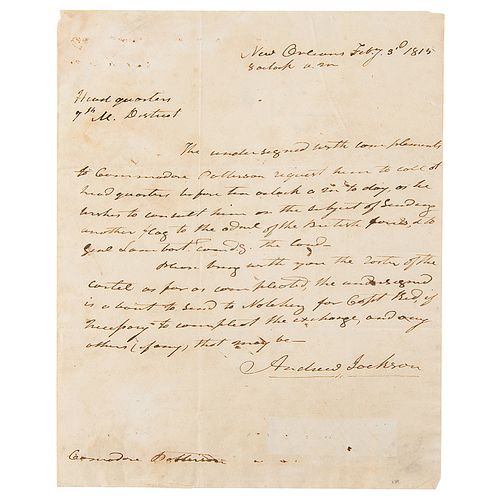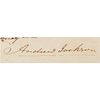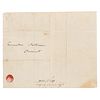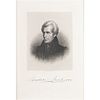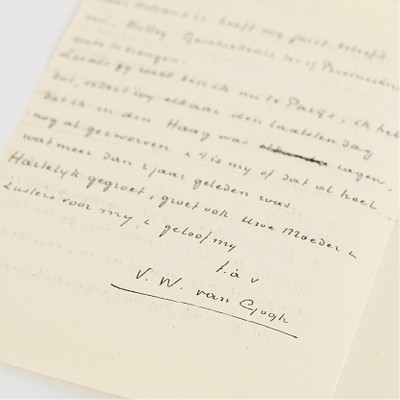Andrew Jackson Autograph Letter Signed
Two ways to bid:
- Leave a max absentee bid and the platform will bid on your behalf up to your maximum bid during the live auction.
- Bid live during the auction and your bids will be submitted real-time to the auctioneer.
Bid Increments
| Price | Bid Increment |
|---|---|
| $0 | $5 |
| $50 | $10 |
| $200 | $25 |
| $500 | $50 |
About Auction
Jun 15, 2022
RR Auction's June Fine Autograph and Artifact sale brings over 800 extraordinary items to the auction block, including: a four-page musical manuscript by Wolfgang Amadeus Mozart, containing four canons and an early autograph letter signed by the celebrated painter Vincent van Gogh. RR Auction support@rrauction.com
- Lot Description
Monumental war-dated ALS, one page, 8 x 10, February 3, 1815. A handwritten letter from Andrew Jackson as major general, sent to Commodore Daniel Patterson and addressed from the 7th military district headquarters in New Orleans, in part: "The undersigned with complements to Commodore Patterson request him to call at headquarters before ten o’clock am today, as he wishes to consult him on the subject of sending another flag to the adml of the British forces, & to Genl Lambert comdg‰Û_Please bring with you the roster of the cartel as far as compleated, the undersigned is about to send to‰Û_for Capt‰Û_if necessary to compleat the exchange, and any others (if any) that may be.” Matted to an overall size of 11.5 x 16. In fine condition, with faint staining and slightly irregular light toning. Accompanied by an engraved portrait of Jackson bearing a facsimile signature.
This remarkable letter dates to shortly after the Battle of New Orleans, the climax of the five-month Gulf Campaign, and the closing conflict of the War of 1812 that had formally ended on December 24, 1814, with the signing of the Treaty of Ghent. As the pact was signed across the Atlantic in what was then the United Netherlands (now Belgium), it took a month for news of the treaty to reach the United States, during which period American forces under General Jackson won the Battle of New Orleans on January 8, 1815. Despite a large British advantage in numbers, training, and experience, the American forces defeated a poorly executed assault in slightly more than 30 minutes. The Americans suffered just 71 casualties, while the British suffered over 2,000. Although the treaty did not take effect until the U.S. Senate ratified it unanimously on February 16, 1815, some two weeks after this missive, a strong sense of finality no doubt hung in the Gulf winds as Jackson and his men made preparations for a peaceful exchange of flags. Considered by many to be one of the greatest American land victories of all time, the battle made Jackson an American hero and propelled him to the presidency in 1829.
Letters or documents that connect Jackson with the historic Battle of New Orleans are highly sought by collectors, perhaps even more so than his missives as president. The mention of Commodore Daniel Patterson and Major General John Lambert, two men who played critical roles at New Orleans, add great appeal to the already engaging content; however, the distinction of this letter having been personally penned by Jackson a mere month after the conflict places it safely and squarely into a category of considerable importance, intrigue, and scarcity. We have at no other time offered a Jackson letter that dates to so near his career-turning role at the Battle of New Orleans. - Shipping Info
-
Bidder is liable for shipping and handling and providing accurate information as to shipping or delivery locations and arranging for such. RR Auction is unable to combine purchases from other auctions or affiliates into one package for shipping purposes. Lots won will be shipped in a commercially reasonable time after payment in good funds for the merchandise and the shipping fees are received or credit extended, except when third-party shipment occurs. Bidder agrees that service and handling charges related to shipping items which are not pre-paid may be charged to a credit card on file with RR Auction. Successful international Bidders shall provide written shipping instructions, including specified Customs declarations, to RR Auction for any lots to be delivered outside of the United States. NOTE: Declaration value shall be the item’(s) hammer price and RR Auction shall use the correct harmonized code for the lot. Domestic Bidders on lots designated for third-party shipment must designate the common carrier, accept risk of loss, and prepay shipping costs.
-
- Buyer's Premium



 EUR
EUR CAD
CAD AUD
AUD GBP
GBP MXN
MXN HKD
HKD CNY
CNY MYR
MYR SEK
SEK SGD
SGD CHF
CHF THB
THB